Citroen GRAND C4 PICASSO RHD 2016 2.G Owner's Manual
Manufacturer: CITROEN, Model Year: 2016, Model line: GRAND C4 PICASSO RHD, Model: Citroen GRAND C4 PICASSO RHD 2016 2.GPages: 523, PDF Size: 13.63 MB
Page 181 of 523
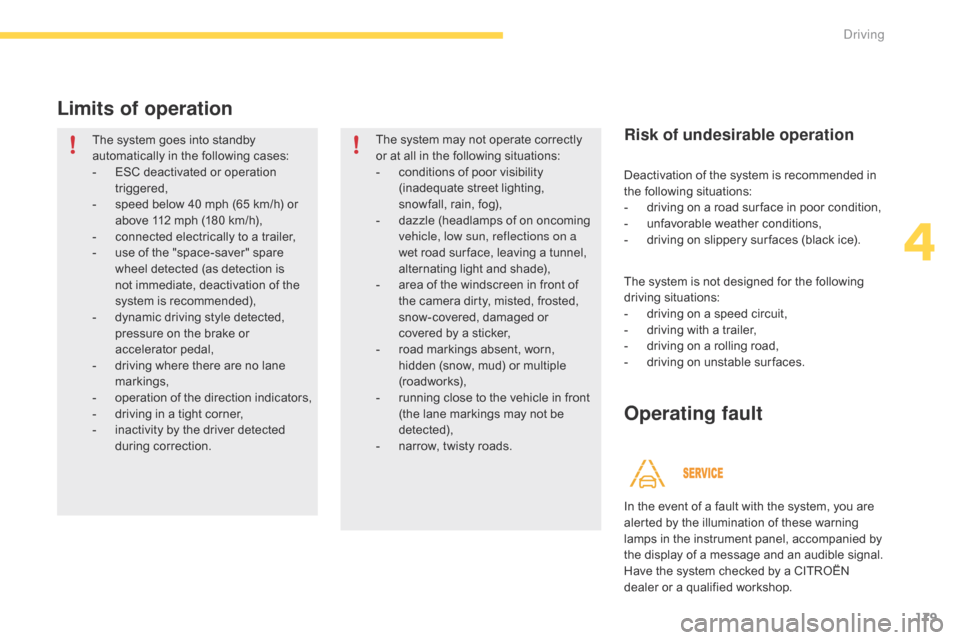
179
Limits of operation
The system goes into standby automatically in the following cases:
-
ES
C deactivated or operation
t
riggered,
-
s
peed below 40 mph (65 km/h) or
a
bove 112 mph (180 km/h),
-
c
onnected electrically to a trailer,
-
u
se of the "space-saver" spare
w
heel detected (as detection is
n
ot immediate, deactivation of the
s
ystem is recommended),
-
d
ynamic driving style detected,
p
ressure on the brake or
a
ccelerator
ped
al,
-
d
riving where there are no lane
ma
rkings,
-
ope
ration
o
f
t
he
d
irection
i
ndicators,
-
d
riving in a tight corner,
-
i
nactivity by the driver detected
d
uring
c
orrection. The
system may not operate correctly o
r at all in the following situations:
-
c
onditions of poor visibility
(
inadequate street lighting,
s
nowfall, rain, fog),
-
d
azzle (headlamps of on oncoming
v
ehicle, low sun, reflections on a
wet
road sur face, leaving a tunnel,
a
lternating light and shade),
-
a
rea of the windscreen in front of
t
he camera dirty, misted, frosted,
s
now-covered, damaged or
c
overed by a sticker,
-
r
oad markings absent, worn,
h
idden (snow, mud) or multiple
(
roadworks),
-
r
unning close to the vehicle in front
(
the lane markings may not be
d
etected),
-
n
arrow, twisty roads.Risk of undesirable operation
Deactivation of the system is recommended in the following situations:
-
d
riving on a road sur face in poor condition,
-
u
nfavorable weather conditions,
-
d
riving on slippery sur faces (black ice).
The
system is not designed for the following
d
riving
s
ituations:
-
d
riving on a speed circuit,
-
d
riving with a trailer,
-
d
riving on a rolling road,
-
d
riving on unstable sur faces.
In
the event of a fault with the system, you are
a
lerted by the illumination of these warning
l
amps in the instrument panel, accompanied by
t
he display of a message and an audible signal.
Have
the system checked by a CITROËN
d
ealer or a qualified workshop.
Operating fault
4
Driving
Page 182 of 523
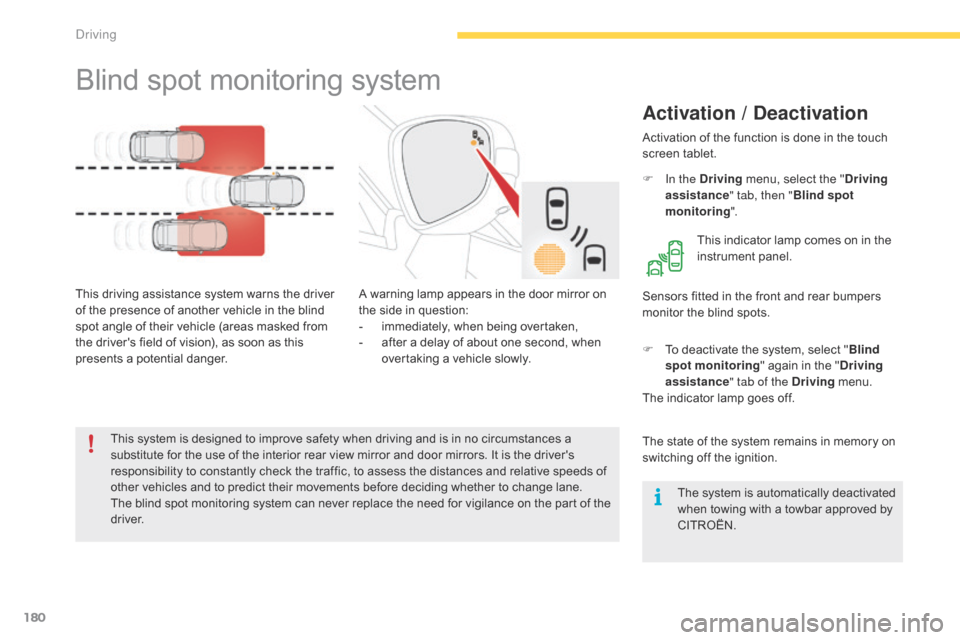
180
Blind spot monitoring system
Activation / Deactivation
A warning lamp appears in the door mirror on the side in question:
-
i
mmediately, when being overtaken,
-
a
fter a delay of about one second, when
ov
ertaking a vehicle slowly.
This
driving
assistance
system
warns
the
driver
o
f
the
presence
of
another
vehicle
in
the
blind
s
pot
angle
of
their
vehicle
(areas
masked
from
t
he
driver's
field
of
vision),
as
soon
as
this
p
resents
a
potential
danger. Sensors
fitted in the front and rear bumpers
m
onitor the blind spots.
This
system
is
designed
to
improve
safety
when driving and is in no circumstances a
s
ubstitute
for
the
use
of
the
interior
rear
view
mirror and door mirrors. It is the driver's
r
esponsibility
to
constantly
check
the
traffic,
to assess the distances and relative speeds of
o
ther
vehicles
and
to
predict
their
movements before deciding whether to change lane.
The
blind
spot
monitoring
system
can
never
replace the need for vigilance on the part of the
d
river. Activation
of the function is done in the touch
s
creen
t
ablet.
F
I
n the Driving
menu, select the "
Driving
assistance " tab, then "Blind spot
monitoring ".
This indicator lamp comes on in the
in
strument
pan
el.
The state of the system remains in memory on
s
witching off the ignition.
F
T
o deactivate the system, select "Blind
spot monitoring "
again in the "Driving
assistance " tab of the Driving
menu.
The
indicator lamp goes off.
The
system is automatically deactivated
w
hen towing with a towbar approved by
CIT
ROËN.
Driving
Page 183 of 523
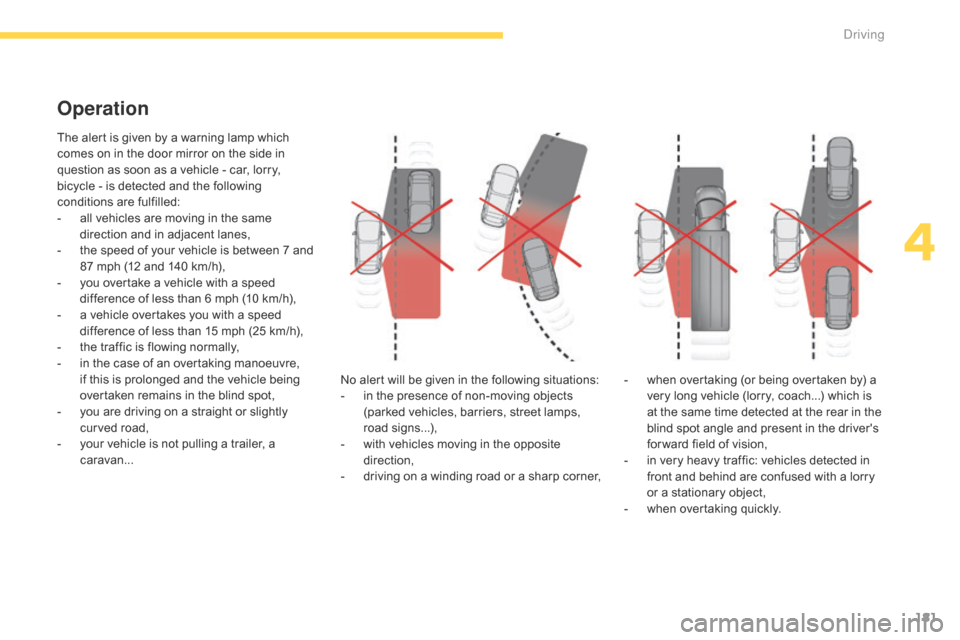
181
The alert is given by a warning lamp which comes on in the door mirror on the side in
q
uestion as soon as a vehicle - car, lorry,
b
icycle - is detected and the following
c
onditions are fulfilled:
-
a
ll vehicles are moving in the same
d
irection and in adjacent lanes,
-
t
he speed of your vehicle is between 7 and
87
mph (12 and 140 km/h),
-
y
ou overtake a vehicle with a speed
d
ifference of less than 6 mph (10 km/h),
-
a
vehicle overtakes you with a speed
d
ifference of less than 15 mph (25 km/h),
-
t
he traffic is flowing normally,
-
i
n the case of an overtaking manoeuvre,
i
f this is prolonged and the vehicle being
ov
ertaken remains in the blind spot,
-
y
ou are driving on a straight or slightly
c
urved road,
-
y
our vehicle is not pulling a trailer, a
c
aravan... No
alert will be given in the following situations:
-
i
n the presence of non-moving objects
(
parked vehicles, barriers, street lamps,
r
oad
s
igns...),
-
w
ith vehicles moving in the opposite
d
irection,
-
d
riving on a winding road or a sharp corner,
Operation
- when overtaking (or being overtaken by) a v
ery long vehicle (lorry, coach...) which is
a
t the same time detected at the rear in the
b
lind spot angle and present in the driver's
f
or ward field of vision,
-
i
n very heavy traffic: vehicles detected in
f
ront and behind are confused with a lorry
o
r a stationary object,
-
w
hen overtaking quickly.
4
Driving
Page 184 of 523

182
In the event of a fault, this warning lamp flashes for a few moments in
t
he instrument panel, accompanied
b
y a message.
Operating fault
Have it checked by a CITROËN dealer or a qualified w orkshop. The
system may suffer temporary
i
nterference in certain weather
conditions (rain, hail...).
In particular, driving on a wet sur face o
r moving from a dry area to a wet area c
an cause false alerts (for example, the
p
resence of a fog of water droplets in
t
he blind spot angle is interpreted as a
v
ehicle).
In
bad or wintry weather, ensure that
t
he sensors are not covered by mud, ice
o
r snow.
Take
care not to cover the warning zone
i
n the door mirrors or the detection
z
ones on the front and rear bumpers
w
ith adhesive labels or other objects;
t
hey may hamper the correct operation
o
f the system.
High pressure jet wash
When
washing your vehicle, direct the
l
ance at least 30 cm away from the
sen
sors.In
addition to the fixed warning lamp in the door
m
irror on the side in question, a correction of
t
rajectory will be felt if you cross a lane marking w
ith the direction indicators on, to help you a
void a collision.
Conditions for operation
The following systems must be activated:
- b lind spot monitoring,
-
a
ssisted lane departure warning.
Active blind spot
monitoring system
For more information on the Blind spot
mo nitoring system and the Assisted lane
departure warning system , refer to the
corresponding
s
ections.
Driving
Page 185 of 523
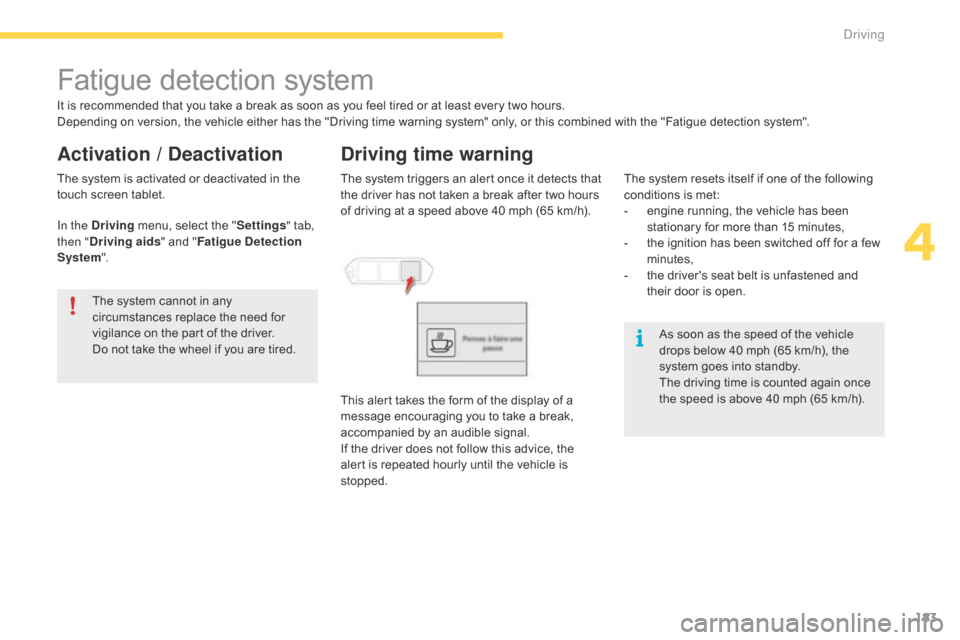
183
Fatigue detection system
It is recommended that you take a break as soon as you feel tired or at least every two hours.
D epending on version, the vehicle either has the "Driving time warning system" only, or this combined with the "Fatigue detection system".
Driving time warning
The system t riggers a n a lert o nce i t d etects t hat t
he driver has not taken a break after two hours
o
f driving at a speed above 40 mph (65 km/h).
This
alert takes the form of the display of a
m
essage encouraging you to take a break,
a
ccompanied by an audible signal.
If
the driver does not follow this advice, the
a
lert is repeated hourly until the vehicle is
s
topped.
The
system
cannot
in
any
c
ircumstances
replace
the
need
for
v
igilance
on
the
part
of
the
driver.
Do
not
take
the
wheel
if
you
are
tired. As
soon as the speed of the vehicle
d
rops below 40 mph (65 km/h), the
s
ystem goes into standby.
The
driving time is counted again once
t
he speed is above 40 mph (65 km/h).
The
system resets itself if one of the following c
onditions is met:
-
e
ngine running, the vehicle has been
s
tationary for more than 15 minutes,
-
t
he ignition has been switched off for a few
m
inutes,
-
t
he driver's seat belt is unfastened and
t
heir door is open.
The
system
is
activated
or
deactivated
in
the
t
ouch
screen
tablet.
Activation / Deactivation
In the Driving menu, select the "Settings " tab,
then " Driving aids "
and "Fatigue Detection
System ".
4
Driving
Page 186 of 523
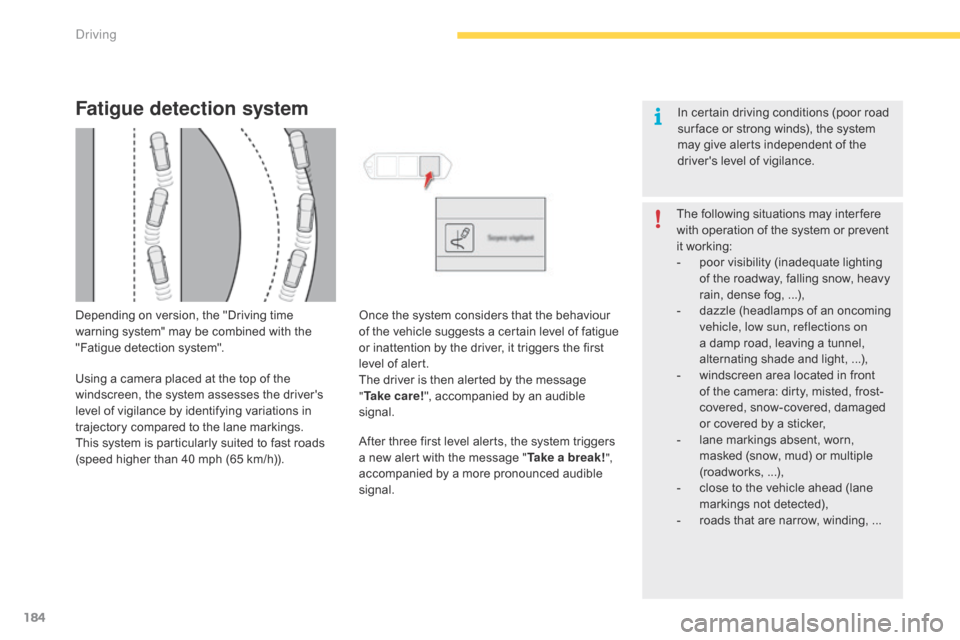
184
Fatigue detection system
Depending on version, the "Driving time warning system" may be combined with the
"
Fatigue detection system".
Using
a camera placed at the top of the
w
indscreen, the system assesses the driver's
l
evel of vigilance by identifying variations in
t
rajectory compared to the lane markings.
This
system is particularly suited to fast roads
(
speed higher than 40 mph (65 km/h)).Once
the system considers that the behaviour o
f the vehicle suggests a certain level of fatigue
o
r inattention by the driver, it triggers the first
l
evel of alert.
The
driver is then alerted by the message
"Ta
k e c a r e !",
accompanied by an audible
s
ignal.
After
three first level alerts, the system triggers
a
new alert with the message "Take a break! ",
accompanied
by a more pronounced audible
s
ignal. In
certain driving conditions (poor road
s
ur face or strong winds), the system
m
ay give alerts independent of the
d
river's level of vigilance.
The following situations may inter fere
w
ith operation of the system or prevent
i
t working:
-
p
oor visibility (inadequate lighting
o
f the roadway, falling snow, heavy
r
ain, dense fog, ...),
- d azzle (headlamps of an oncoming v
ehicle, low sun, reflections on
a
damp road, leaving a tunnel,
a
lternating shade and light, ...),
-
w
indscreen area located in front
o
f the camera: dirty, misted, frost-
covered,
snow-covered, damaged
o
r covered by a sticker,
-
l
ane markings absent, worn,
m
asked (snow, mud) or multiple
(
roadworks, ...),
-
c
lose to the vehicle ahead (lane
m
arkings not detected),
-
r
oads that are narrow, winding, ...
Driving
Page 187 of 523

185
This system indicates the proximity of an obstacle (examples: pedestrian, vehicle, tree,
g
ate) which comes within the field of detection
o
f sensors located in the bumper.
Certain
types of obstacle (examples: stake,
r
oadworks cone) detected initially will no longer
b
e detected at the end of the manoeuvre, if
t
hey are located in blind spots in the sensors'
f
ield
o
f
d
etection.
Parking sensors
This system cannot in any circumstances replace the need for
v
igilance on the part of the driver.The
system is switched on by engaging reverse
g
e a r.
This is confirmed by an audible signal.
The system is switched off when you come out
o
f reverse gear.
Audible assistance
The proximity information is given by an i
ntermittent audible signal, the frequency of which
i
ncreases as the vehicle approaches the obstacle.
The
sound emitted by the speaker (right or
l
eft) indicates the side on which the obstacle is
l
ocated.
When
the distance between the vehicle and
t
he obstacle becomes less than approximately
t
hirty centimetres, the audible signal becomes
c
ontinuous.
Rear parking sensors
Visual assistance
This supplements the audible signal by d isplaying bars in the screen or the instrument
p
anel which move progressively nearer to
t
he vehicle. When the obstacle is near, the
"
Danger" symbol is displayed.
4
Driving
Page 188 of 523
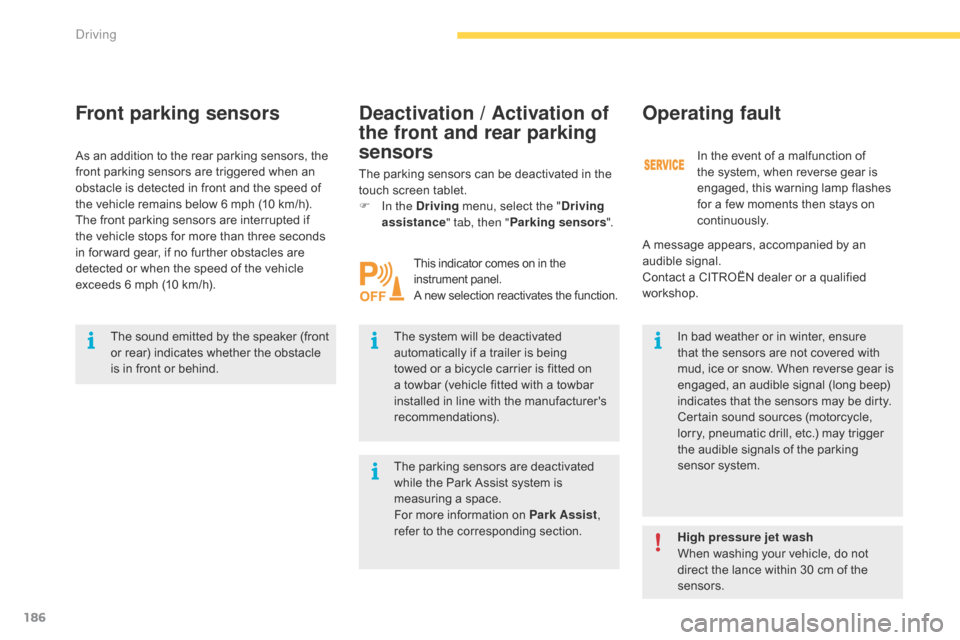
186
Front parking sensors
The sound emitted by the speaker (front or rear) indicates whether the obstacle
i
s in front or behind. The
system will be deactivated a
utomatically if a trailer is being
t
owed or a bicycle carrier is fitted on
a
towbar (vehicle fitted with a towbar
i
nstalled in line with the manufacturer's
r
ecommendations).In
bad weather or in winter, ensure t
hat the sensors are not covered with
m
ud, ice or snow. When reverse gear is
e
ngaged, an audible signal (long beep)
i
ndicates that the sensors may be dirty.
Certain
sound sources (motorcycle,
l
orry, pneumatic drill, etc.) may trigger
t
he audible signals of the parking
s
ensor system.
As
an
addition to the rear parking sensors, the
f
ront
parking sensors are triggered when an
o
bstacle is detected in front and the speed of
t
he
vehicle remains below 6 mph (10 km/h).
The
front parking sensors are interrupted if
t
he
vehicle stops for more than three seconds
i
n
for ward gear, if no further obstacles are
d
etected or when the speed of the vehicle
e
xceeds 6 mph (10 km/h). The parking sensors can be deactivated in the
t
ouch screen tablet.
F
I
n the Driving
menu, select the "
Driving
assistance " tab, then "Parking sensors ".
Operating fault
In the event of a malfunction of t
he system, when reverse gear is
e
ngaged, this warning lamp flashes
f
or a few moments then stays on
c
ontinuously.
This indicator comes on in the in strument pan el.
A
new selection reactivates the function.
High pressure jet wash
When washing your vehicle, do not
d
irect the lance within 30 cm of the
sen
sors.
The
parking
sensors
are
deactivated
w
hile
the
Park
Assist
system
is
m
easuring
a
space.
For
more
information
on
Park Assist
,
refer
to
the
corresponding
section.
Deactivation / Activation of
the front and rear parking
sensors
A message appears, accompanied by an a
udible s ignal.
Contact
a CITROËN dealer or a qualified
w
orkshop.
Driving
Page 189 of 523
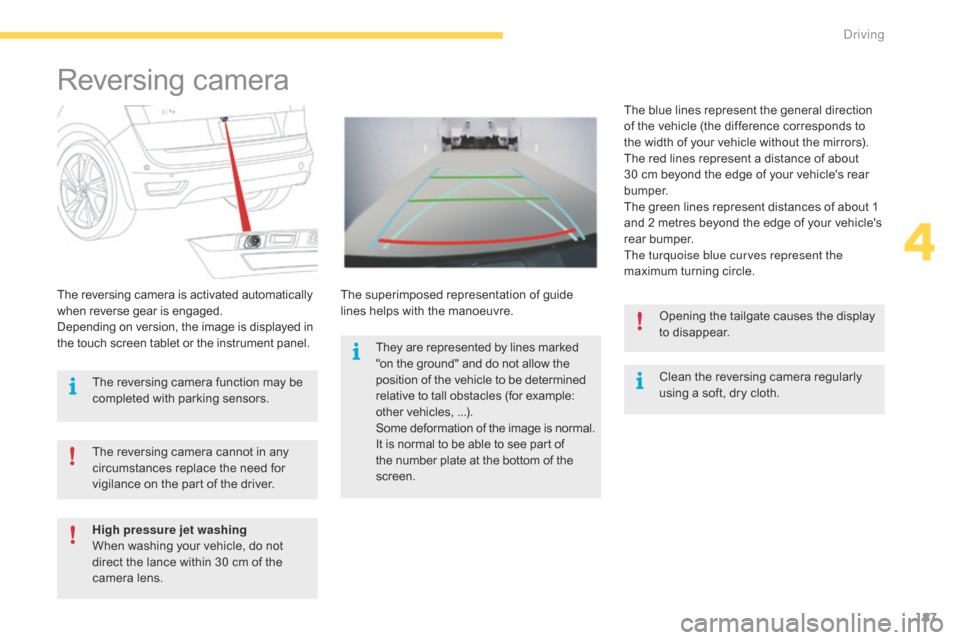
187
Reversing camera
Clean the reversing camera regularly u
sing a soft, dry cloth.
The
reversing
camera
is
activated
automatically
w
hen
r
everse
g
ear
i
s
enga
ged.
Depending
on
version,
the
image
is
displayed
in
t
he
touch
screen
tablet
or
the
instrument
panel. The
superimposed
representation
of
guide
l
ines
helps
with
the
manoeuvre. The
blue lines represent the general direction
o
f
the
vehicle (the difference corresponds to
t
he
width of your vehicle without the mirrors).
The
red lines represent a distance of about
3
0
cm
beyond the edge of your vehicle's rear
b
u m p e r.
The
green lines represent distances of about 1
a
nd
2
metres beyond the edge of your vehicle's
r
ear
bumper.
The turquoise blue curves represent the
maximum turning circle.
The
reversing
camera
cannot
in
any
c
ircumstances
replace
the
need
for
v
igilance
on
the
part
of
the
driver. Opening
the tailgate causes the display
t
o disappear.
The
reversing
camera
function
may
be
c
ompleted
with
parking
sensors.
High pressure jet washing
When
washing
your
vehicle,
do
not
d
irect
the
lance
within
30
cm
of
the
c
amera
lens. They
are
represented
by
lines
marked
"
on
the
ground"
and
do
not
allow
the p
osition
of
the
vehicle
to
be
determined r
elative
to
tall
obstacles
(for
example:
o
ther
vehicles, ...).
Some
d
eformation
o
f
t
he
i
mage
i
s
n
ormal.
It
is
normal
to
be
able
to
see
part
of
t
he
number
plate
at
the
bottom
of
the
sc
reen.
4
Driving
Page 190 of 523
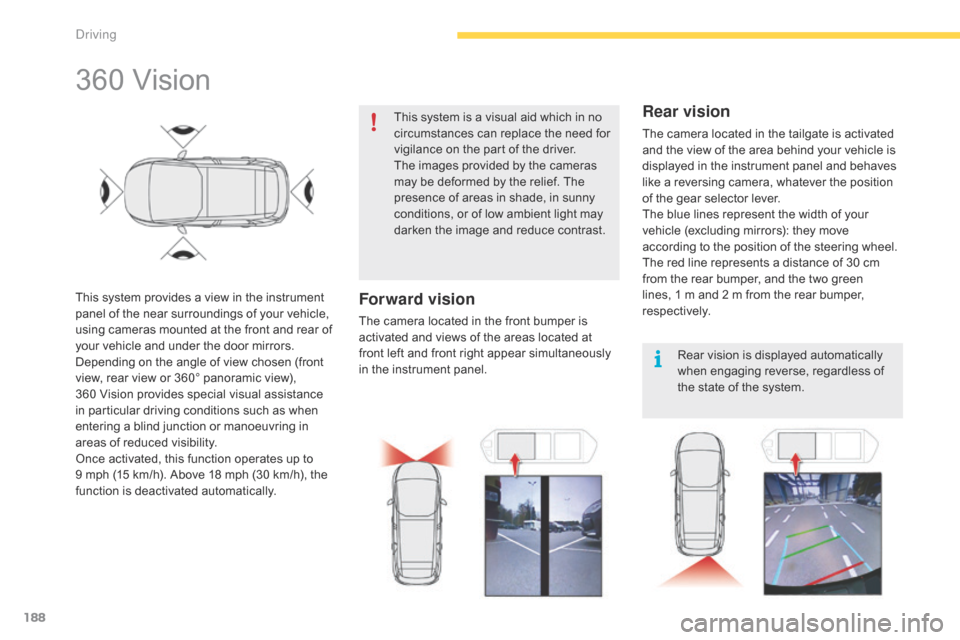
188
360 Vision
This system provides a view in the instrument panel of the near surroundings of your vehicle,
u
sing cameras mounted at the front and rear of
y
our vehicle and under the door mirrors.
Depending
on the angle of view chosen (front
v
iew, rear view or 360° panoramic view),
3
60 Vision provides special visual assistance
i
n particular driving conditions such as when
e
ntering a blind junction or manoeuvring in
a
reas of reduced visibility.
Once
activated, this function operates up to
9 m
ph (15 km/h). Above 18 mph (30 km/h), the
f
unction is deactivated automatically. This
system is a visual aid which in no
c
ircumstances can replace the need for
v
igilance on the part of the driver.
The images provided by the cameras
m
ay be deformed by the relief. The
p
resence of areas in shade, in sunny
c
onditions, or of low ambient light may
d
arken the image and reduce contrast.Forward vision
The camera located in the front bumper is a
ctivated and views of the areas located at
f
ront left and front right appear simultaneously
i
n the instrument panel.
Rear vision
The camera located in the tailgate is activated and the view of the area behind your vehicle is
d
isplayed in the instrument panel and behaves
l
ike a reversing camera, whatever the position
o
f the gear selector lever.
The
blue lines represent the width of your
v
ehicle (excluding mirrors): they move
a
ccording to the position of the steering wheel.
The
red line represents a distance of 30 cm
f
rom the rear bumper, and the two green
l
ines, 1 m and 2 m from the rear bumper,
r
espectively. Rear
vision is displayed automatically
w
hen engaging reverse, regardless of
t
he state of the system.
Driving